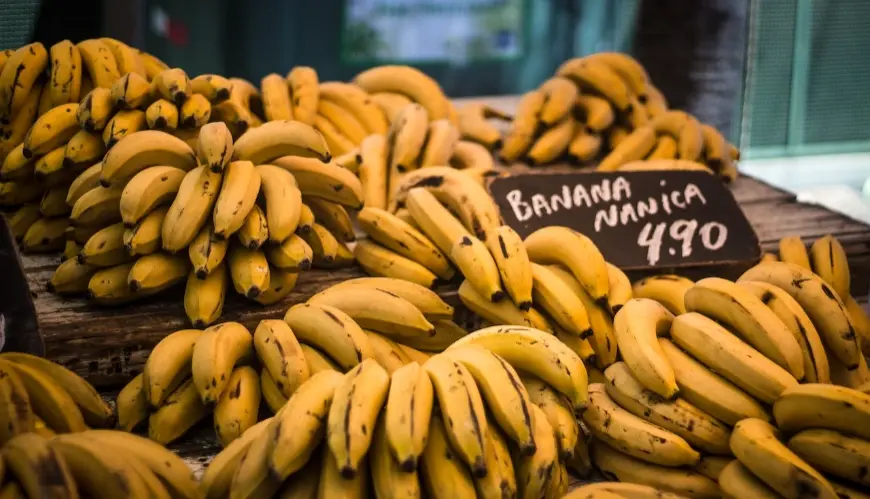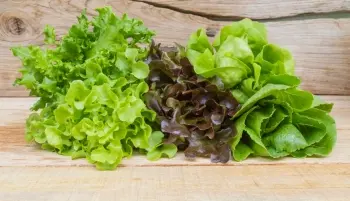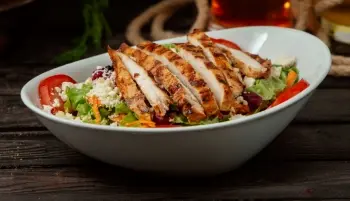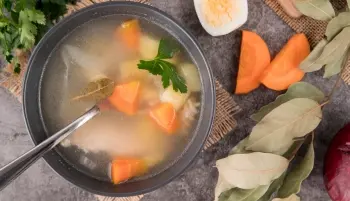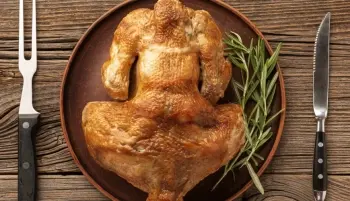Should you be concerned if you've learned that bananas contain a high amount of carbs? Could this make them an unhealthy choice of fruit? Bananas mainly consist of complex carbohydrates such as resistant starch, beneficial for digestive health. They're also packed with vitamins and potassium which can help regulate your blood pressure and promote general well-being.
Nutritional Value of Bananas
A medium-sized banana, weighing approximately 118 grams, offers around 105 calories. It contains about 27 grams of carbohydrates, 14.4 grams of sugars and roughly about 1.3 gram protein. One crucial nutrient bananas are rich in is potassium; a single serving holds as much as 422 milligrams. Have a look at the nutritional breakdown provided by USDA.
How many calories in a banana? 105 calories
- Fat: 0.4g
- Sodium: 1.2mg
- Carbohydrates: 27g
- Fiber: 3.1g
- Sugars: 14.I4g
- Protein: 1.g3
- Potassium: 422mg
- Vitamin C: 10.3 mg
- Magnesium: 31.9 mg
Carbohydrates
Every medium-sized banana (ranging from 7" to nearly 8" in length) contains about 27g of carbs. Comprising this carbohydrate content are around 3g of fibre and a little over 14 grams of sugars that occur naturally within the fruit. When planning their carbohydrate portions, those managing diabetes should count every banana as exactly two carb counts or choices.
In addition, there's a stark contrast between bananas at various stages of ripeness; for instance, resistant starch typical to fibres morphs into sugar as bananas mature over time. Consequently, a ripe yellow-spotted banana would usually have more sugar and less fibre relative to an unripe green equivalent with similar dimensions. Bananas typically score between 48 and 54 on the glycemic index scale.
Fats
Bananas contain a minimal amount of fat, with under 0.5 grams for an average-sized banana. They carry trace amounts of vitamins A and K which are fat-soluble; as such combining them with fats aids in maximizing their nutritional potential. The widely favored combination of peanut butter (two tablespoons) and bananas offers around 10 grams of monounsaturated fats, approximately 3.3 grams polyunsaturated fats, and barely any saturated fats at just about 2.8 grams per serving.
Protein
Bananas don't contain much protein; a medium-sized one has less than 1.5 grams. Peanut butter, however, is frequently paired with bananas as a potent and plant-based protein source - two tablespoons hold around 8g of protein.
Nutrients in Bananas
Bananas are recognized for the high quantity of potassium they contain. For instance, one medium banana will provide you with 422mg of potassium, which turns out to be around 9% of the daily requirement as per USDA guidelines. Additionally, bananas also possess other key nutrients such as vitamin C, folate, magnesium and choline.
Caloric Value
A single medium banana that weighs around 118g has a caloric count of 105. How does this stack up against other popular fruits? A gala apple of medium size carries approximately 61 calories, while an average naval orange has about 72.8 calorie content. Moreover, a cup's worth (150g) red seedless grapes offer up to 129 calories.
Overview
Bananas are an excellent source of potassium, filled with carbohydrates, vitamin C and magnesium too.
Advantages to Health
Bananas, a widely loved fruit, offer numerous perks aside from that after-exercise dose of potassium. Below are a few methods by which bananas can enhance your wellbeing.
Aids in Regulating Diabetes
Unripe bananas hold a significant quantity of resistant starch, behaving similar to dietary fiber when digested. Owing to their nutritious properties, they are frequently made into homogenate or powder and incorporated within foods that serve specific health needs as well as various research investigations.
A synthesis of multiple studies deduced green banana flour to have the potential for enhancing insulin responsiveness, advocating weight reduction, and alleviating several hepatic and renal complications linked with diabetes- factors all advantageous towards managing the disease over an extended period.
Supports Regular Bowel Movements
Bananas serve as a rich source of prebiotics, fermentable fibers that nourish beneficial gut bacteria. These "friendly" bacteria facilitate digestion by promoting the development of other good gut microbes which aid in food breakdown. Combining bananas with foods harboring live cultures like yogurt sets the stage for better digestive health and contributes to bowel regularity.
In addition, research on green bananas indicates beneficial outcomes for treating both constipation and diarrhea symptoms in children. Ingesting bananas provides an easy strategy to maintain a healthy digestive system.
Assists in Shedding Pounds
Bananas are often dismissed due to their elevated starch content, nevertheless, they contain low calories and a significant amount of satiating fiber that cater to weight loss ambitions. With roughly 3 grams of fiber equivalent to every hundred calories, it presents an excellent avenue for feeling stuffed without overindulging.
Research results indicate a correlation between a surge in your diet's fiber component, decline in calorie consumption and decrease in weight. A collective research analysis implies that daily supplementing the diet with 14 grams of fiber (which is tantamount to reducing calorie intake by 10%) could result in losing about 4.4 pounds within four months duration. Using bananas as breakfast or snack could make achieving and sustaining ideal body weight easier.
Reduces Hypertension
A medium-sized banana, an abundant source of potassium, meets roughly 9% of the typical daily intake for adults. The hypertensive ability of potassium has been thoroughly examined and is especially significant when combined with a low-sodium diet or the DASH plan.
Incorporating bananas into your habitual diet aids in fulfilling daily potassium needs to maintain controlled blood pressure levels and deter additional health concerns such as stroke or kidney illness. Enhance your overall wellbeing by opting for a banana over sodium-laden snacks.
Possible Aid in Wound Rupture Repair
The banana peel's insides have been utilized for wound care due to their inherent antioxidant and anti-inflammatory characteristics, popularizing them in traditional medicine. They are typically applied on minor injuries or mosquito bites to facilitate a soothing sensation and provide a protective layer that aids healing.
While contemporary medical science may not fully validate this practice, the consumption of bananas undoubtedly provides nutrients beneficial for wound repair such as vitamin C and various other antioxidants. A medium-sized banana can cater approximately 11% of your daily vitamin C requirements which is crucial as it functions as a collagen precursor - an important element that maintains skin coherence.
Hypersensitivities
Even though it's uncommon, there are reported cases of hypersensitivity to bananas. Certain individuals suffer from what is known as Oral Allergy Syndrome (OAS), which is when pollen allergens have a cross-reaction with various fruits, including bananas. There appears to be an association between banana allergies and those related to natural rubber latex. Survey studies suggest that between 20% and half of the patients who present allergies to latex also respond adversely to bananas.
Symptoms accompanying such allergies may incorporate skin rashes called urticaria or hives, nausea potentially leading up to vomiting, lightheadedness, difficulty in breathing or even progressing towards anaphylaxis - a severe allergic reaction needing urgent medical attention. Although not yet confirmed through extensive research, some records indicate acute pancreatitis resulting from food allergy specific towards bananas. If you suspect intolerance for bananas causing these symptoms it's advisable that you consult with a specialist on allergies for comprehensive examination.
Negative Impacts
Despite being mostly advantageous for digestive well-being, consumption of bananas tends to cause constipation in a few individuals upon amplifying their fiber consumption through such foods. If your diet isn't rich in fiber ordinarily, implement the raise step by step and hydrate abundantly. This practice will assist your system to transition smoothly into accepting the escalated intake of fiber.
Types
Over 1,000 different types of bananas are cultivated globally. The Musa Cavendish leads the pack, accounting for close to half (45%) of all bananas sold worldwide.
Plantains too fall under the banana category and boast an impressive over 100 subvariants. Your local grocery store or ethnic supermarket might carry diverse kinds and forms of this fruit. Trying out these various options could heighten your appreciation for this classic snack.
Optimal Time
Shop for bananas while they are still green. This provides ample time for them to mature exactly to your preference. You can obtain fresh bananas from the grocery store throughout the year.
Storage and Food Safety
Bananas transition from green to yellow, then brown as they mature. Should you buy unripe bananas, afford them the liberty to ripen in room temperature without any covering placed on them. To hasten their maturing process, position your green bananas inside a paper bag or place them adjacent to other ripe fruits. Using plastic bags for storing bananas is discouraged because sealing off this tropic fruit traps in unnecessary moisture which can lead to rotting.
When the color of your bananas hits that perfect shade of yellow that aligns with your preference, it's time you enjoyed your sweet snack! If immediate consumption isn't possible though, prolong their freshness by opting for refrigeration; an option affording up seven more days before expiration kicks in. Note however that while banana peels may take on an intimidating black hue upon exposure to refrigerator temperatures, the quality of banana flesh remains undiminished nonetheless.
Moreover, you have another storage alternative available: freezing! With peeled and subsequently sliced or mashed ripe bananas sealed tight in freezer-friendly bags taking residence in your freezer unit works splendidly should later inclusion into smoothies or baked goods be anticipated. It's worth noting too that there exists zero necessity to rinse or blanch this type of stored fruit prior freezing so long as proper hand hygiene is observed before touching them.
Preparation
There is a plethora of techniques to revel in the sweetness of bananas. Incorporate banana slices into your bare oatmeal or yogurt for an invigorating hint of nectar. Opt to spread crushed banana on whole wheat bread smothered in peanut butter, rather than using jelly.
Frozen bananas serve as a fantastic alternative to ice cream. You could enjoy a frozen pureed banana coated with just a touch of dark chocolate, crown it with crumbled almonds and there you have an appetizing, low-calorie dessert.
It's common practice for most people to consume only the pulp part and discard the peel; however, don't be so quick to throw them away - banana peels are indeed edible! They're often found used creatively in vegan cuisine and Japanese dishes. Nevertheless, bear in mind they can be somewhat resistant when digesting if you're not accustomed to eating them.
Try Delicate Banana Pancakes and Other 27 Protein-Rich Breakfasts
